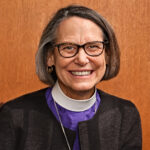Diocesan Convention
- The Bishop presides over the Diocesan Convention, the ultimate organizational decision-making body of the Diocese comprised of clergy and lay members. Convention meets annually for one or two days in October.
- The Convention decides the Diocesan budget (based on recommendations from the Budget and Finance Committee of the Diocesan Council, elects members of the diocese’s various administrative, executive and judicial bodies and votes on any resolutions—including those that amend or add to the Constitution or Canons—that may be brought before it.
- When necessary, this is the body that elects a Bishop, a Bishop Coadjutor or a Bishop(s) Suffragan.
Diocesan Council
Diocesan Council is comprised of two representatives, one lay person and one member of the clergy, serving three year terms elected from each of the eight area deaneries, plus several others appointed by the Bishop to help create balance and diversity. The bishop of the diocese chairs Diocesan Council.
The purpose of Diocesan Council is to oversee the business of the diocese between the annual diocesan conventions, including developing the draft and proposed budgets for submission to the annual convention.
The current canons also make Diocesan Council the legal board of directors of the diocese.
Trustees
The Trustees of the Diocese receive transfers of property to the Diocese for express purposes, and may receive funds from recognized congregations and other funds of the Diocese for investment purposes, invest such funds as directed or in their discretion as trustees they may determine; and to collect and receive all income from the funds, and pay out the net income for the purposes of the Diocese as established by Diocesan Council in the case of diocesan funds or pursuant and subject to the terms of the trust or trusts or other direction under which property or money has been received by it. The Trustees consist of the Bishop and 16 other members, 4 clergy entitled to vote at convention and 12 laypersons who are communicants in good standing of a congregation admitted as a Voting Congregation. 4 members, one member of the clergy and 3 laypersons, are elected at each Annual Convention. The term of office is 4 years. The Trustees meet quarterly at the Episcopal Church Center.




